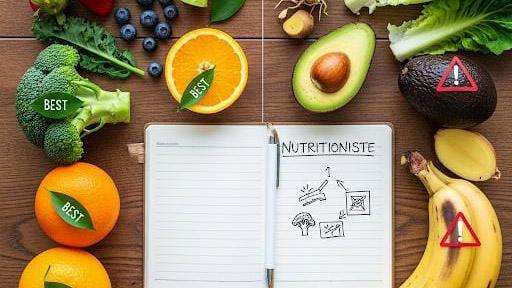In the world of healthy eating, fruits and vegetables are the undisputed champions. But with so many options available, it's easy to wonder which ones truly pack a punch and which should be enjoyed in moderation. We've compiled a guide based on the latest insights from nutritionists to help you navigate the produce aisle.
The Fruit and Veggie All-Stars: The Most Nutritious Picks
When it comes to getting the most bang for your nutritional buck, certain fruits and vegetables consistently rise to the top. These "powerhouse" foods are lauded for their high concentration of vitamins, minerals, fiber, and potent antioxidants.
- Leafy Greens: Topping almost every list are leafy greens like spinach, kale, and Swiss chard. They are incredibly nutrient-dense, providing essential vitamins (A, C, K), minerals (iron, magnesium, calcium), and antioxidants that support everything from heart health to bone density.
- Berries: Little but mighty, berries such as blueberries, raspberries, and blackberries are celebrated for their antioxidant and anti-inflammatory properties. They are rich in anthocyanins, which have been linked to a reduced risk of chronic diseases like type 2 diabetes and heart disease.
- Cruciferous Vegetables: Think broccoli, cauliflower, and Brussels sprouts. These vegetables are not only excellent sources of fiber and vitamins C and K but also contain unique compounds that are believed to have cancer-fighting properties.
- Avocados: While technically a fruit, avocados are unique for their high content of healthy monounsaturated fats. They are also packed with fiber, potassium, and a wide range of vitamins, making them a fantastic choice for heart health and satiety.
- Sweet Potatoes and Carrots: Don't overlook these vibrant root vegetables. They are a stellar source of beta-carotene, which your body converts to Vitamin A, crucial for good vision and a healthy immune system.
The "Worst" Isn't Bad: Fruits and Veggies to Enjoy in Moderation
It's important to remember that all fruits and vegetables offer health benefits. The term "worst" here simply refers to options that, while still healthy, may have a higher sugar or calorie content and should be consumed in smaller portions, especially if you have specific dietary goals.
- Dates and Dried Fruits: Dates and other dried fruits are rich in fiber and micronutrients, but their water has been removed, concentrating their natural sugars and calories. A small serving can be a great energy booster, but it's easy to overdo it.
- Coconut: Fresh coconut meat provides healthy fats and fiber, but many packaged coconut products, like sweetened water and dried flakes, are often high in added sugars and should be consumed sparingly.
- White Potatoes: While a good source of potassium and other nutrients, white potatoes are often excluded from "powerhouse" lists because of their higher glycemic index, which can have a more significant impact on blood sugar levels compared to other vegetables. However, eating them with the skin on and pairing them with other high-fiber foods can help mitigate this effect.
The key takeaway from nutrition experts is to focus on a variety of fruits and vegetables in your diet. Aim for a rainbow of colors to ensure you're getting a diverse range of nutrients. While some may be more "super" than others, every fruit and vegetable has a place in a balanced, healthy eating plan.








.svg)
